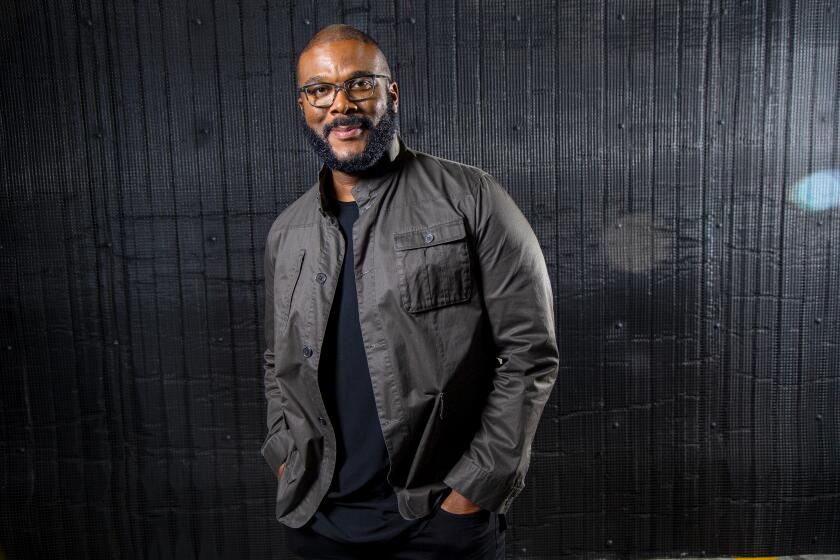Tom Ford had to give life to ‘A Single Man’
Tom Ford has ruminated about death ever since he was a small boy growing up in Texas. It was the flip side to his early, genetic fascination with beauty. “Everything in life is bittersweet for me, because when I see something beautiful, I also see it aging, old, dead, gone,” he says. “I was very aware of mortality. I was very aware of my time on the planet.” Still today, almost every morning he awakes and wonders, “If I die tomorrow, what am I going to miss?”
Ford speaks quickly and hypnotically, words rolling out with a seductive, almost aromatic intensity. Intimations of death swirl around his directorial debut, “A Single Man,” based on the Christopher Isherwood novel, which opens Friday. Set in 1962 Los Angeles, it is the lushly beautiful tale of a suicidal, gay college professor ( Colin Firth) contemplating his last day on earth in the wake of the sudden death of his longtime lover.
It is the morning after the film’s Los Angeles premiere and the fashion-designer-turned-filmmaker looks like he’s stepped out of one of his own ads, clean and crisp in a bold black Tom Ford suit and white shirt. Yet sitting in his all-black Sunset Strip office, with its shock of white flowers, Ford speaks of another Tom Ford, quieter, more introverted than the persona of the man who reinvented Gucci.
This Ford loves to strip off his Tom Ford suit of armor the moment he arrives home (either in L.A. or London) and remain naked. He’s the 48-year-old who had a midlife crisis after quitting his job as creative director of Gucci in 2004, following a power struggle with the new owners. Exhausted by the insatiability of the fashion world and culture generally, he made a quiet film about learning to “appreciate what you have.” “A Single Man” has already garnered Oscar mentions for Colin Firth, who won the best actor prize at the Venice Film Festival.
Ford joins a growing list of luminaries from other fields trying their hands at film directing, with varying success, including painter Julian Schnabel, who was nominated for an Oscar for directing “The Diving Bell and the Butterfly”; Moviefone founder Andrew Jarecki, who made “Capturing the Friedmans”; and rockers like Rob Zombie and Limp Bizkit front man Fred Durst. Admittedly, Ford comes ready-made with experience orchestrating Gucci’s ad campaigns and commercials, and a finely honed aesthetic he describes as “enhanced reality.” “A Single Man” has a mesmerizing sensuousness. “Everyone keeps saying to me, ‘Everyone is so beautiful. Everything is so beautiful.’ I didn’t even notice that!” he says. “That’s just the way I see. That’s the way I think.” This said, Ford’s visual panache is put to the service of a story far from the ephemeral catwalk. “Midlife is when you get to the top of the ladder, only to realize you’ve had the ladder against the wrong wall,” he says, describing his loss of a certain identity after leaving Gucci. He sees the film as a personal reaction to the prevalent culture of more, of almost always thinking life will improve with a new job, or a new pair of shoes.
Ford related to Isherwood’s theme of “the true self observing the false self going through the day,” and grafted details of his own life onto the story, including George’s obsession with ritualistic grooming. The details of his proposed suicide are based on the suicide of one of Ford’s relations, who killed himself in a sleeping bag so as not to make a mess.
Then there’s the relationship between George and his former lover, played by Julianne Moore, who’s forever disappointed George is gay. “That’s my relationship with a lot of women in my life,” Ford says. “I’ve had very heterosexual periods in my life. I’m perfectly sexually attracted to women, but I fall in love with men. Unrequited love is always heartbreaking, especially on the side of the person who feels the love and it’s not returned.”
Long gestation
Ford first read Isherwood’s book back when he was in his early 20s and working as a commercial actor in L.A. “His loneliness and pain spoke to me,” he says. “At the time I was single and I fantasized about running into George somewhere and I could help him.” He actually wound up meeting Isherwood through the painter David Hockney, who was dating Ford’s college boyfriend Ian Falconer. “The one time I did mescaline and shaved off my eyebrow was at David’s house. I couldn’t work for six weeks.”
In the intervening years, Ford quit acting and reinvented himself as a fashion designer, joining Gucci, then a moribund leather company, in 1990, and becoming its creative director in 1994. With his first collection, he launched himself as the new shaman of sex. Today, he explains that his key design motif of “hedonism” was a response to the AIDS crisis.
When he met his longtime boyfriend, fashion editor Richard Buckley, back in 1986, both of their best friends were dying of AIDS. “So we would go out on a date and then each go to a hospital. It didn’t do great things for our early sex life.” As a result of the crisis, “fashion had become completely desexed,” by the early ‘90s, he says.
So Ford brought back the lush touchability of ‘70s fashion, which he knew intimately from clubbing during the last days of Studio 54 in New York. “The beauty standard was kissable. It was soft,” says Ford, who describes the perfect roundness of Farrah Fawcett’s breast. “There was a certain hedonistic quality . . . because we hadn’t had hedonism in so long.”
“A Single Man” touches on the same seize-the-moment, life-affirming theme, though now it’s refracted in a softer, more reflective light. Three decades after he first read Isherwood’s book, “A Single Man” popped into his head again as he was driving to work one day. A film devotee since he was a kid (with passions for Kubrick, De Sica, Hitchcock and Bette Davis), he’d been thinking about making a film for some 15 years.
Ford wrote the screenplay himself (although credit is shared with the writer of an earlier incarnation, David Scearce). Unlike the book, which is essentially a long interior monologue, the cinematic George is contemplating suicide, an addition made by Ford to give the film more plot. The film is frank about gay sexuality, although there are no sexual scenes, he says, because the story is about love.
Getting his ‘Man’
Ford immediately wanted Colin Firth, whom he’d once met at an Oscar party at Madonna’s home, for the lead because of the actor’s screen persona of the buttoned-up romantic.
Yet when Firth first read the script, he didn’t particularly see himself as George, though he was tantalized by the risk: “Everything that would make one question it became the reasons for doing it. . . . It’s not formulaic in any way. . . . Whatever this experience is, it can’t possibly be mundane.”
Firth showed up on a Saturday, and by Monday was filming. It was an intense 21-day shoot, much of it at night. While Ford was un-neurotically precise about the look of the film, he gave the actors unexpected liberty and trust. “He would roll out the entire magazine of film when there was no dialogue, just to see what happened,” Firth says. “So it gave me a sense of freedom.”
Ford was also willing to pay for the $7-million film himself, if need be. The stock market crashed days before filming was to begin last fall, and his original investors pulled out. His friend David Geffen advised him that, if he believed in the movie, he should finance it himself. That’s usually considered a cardinal no-no in Hollywood.
“But I knew I had to make this movie,” says Ford, who wound up selling the film in a seven-figure deal to the Weinstein Co. for distribution. He plans for “A Single Man” to be the first of many films, and to continue parallel careers as both a designer (now of his self-titled line) and a filmmaker.
Again, the concept of his own mortality spurred him on. “I want to make movies that I feel about,” he says. “I’ve never been anybody who cared if they died in a plane crash or not. While I was working on ‘A Single Man,’ it just killed me to think that somehow I might die before I could finish it.”
More to Read
Only good movies
Get the Indie Focus newsletter, Mark Olsen's weekly guide to the world of cinema.
You may occasionally receive promotional content from the Los Angeles Times.










